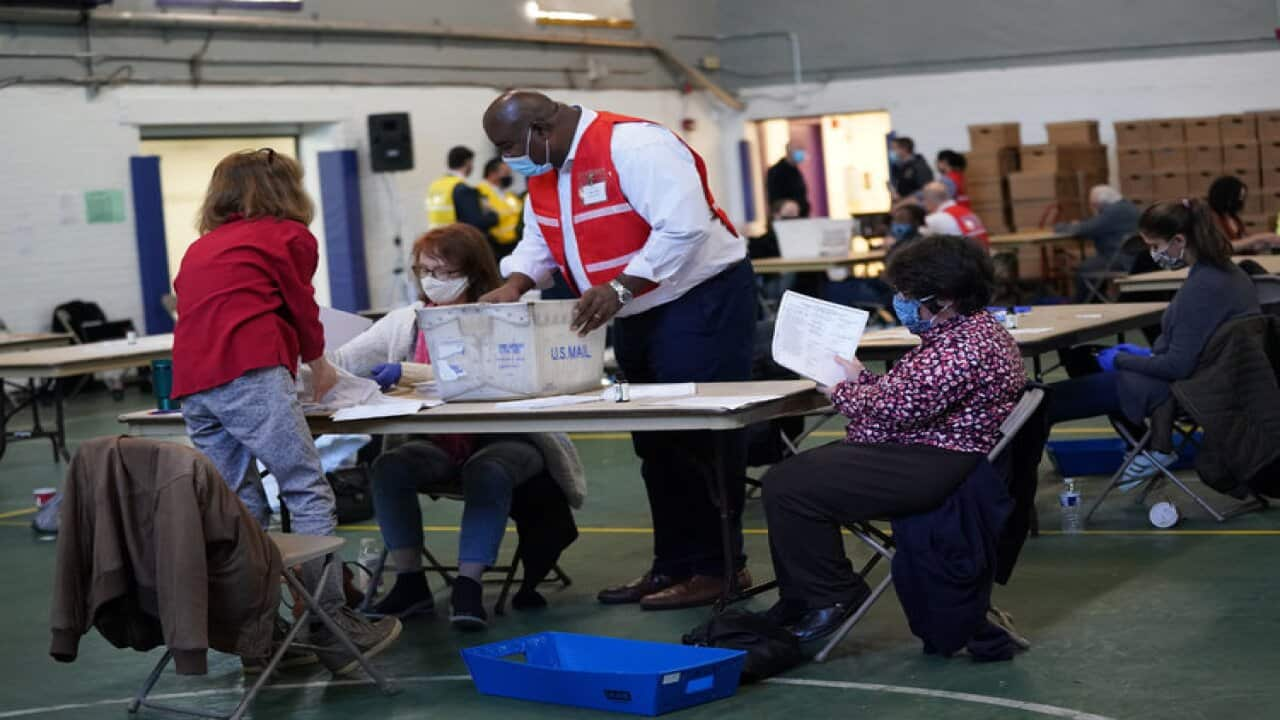United States President Donald Trump has previously sparked controversy by refusing to commit to a peaceful transfer of power if he loses the presidential election, and with , the speculation is continuing.
At a White House press conference in September, Mr Trump was asked directly whether he would yield power if he lost.
“Well we’re going to have to see what happens,” he said. “You know that I’ve been complaining very strongly about the ballots. And the ballots are a disaster.”
A reporter asked: “But people are rioting. Do you commit to making sure there is a peaceful transition of power?”
Follow our US election live blog here
“Get rid of the ballots and we’ll have a very peaceful – there won’t be a transfer, frankly - there’ll be a continuation,” Mr Trump said.
Critics took this statement to mean one thing: if the president goes down, he's not leaving without a fight.
How is Trump reacting to the result?
despite several states still counting ballots. But after days of further counting, his Democratic challenger Mr Biden took the crucial battleground state of Pennsylvania meaning he would become the 46th US president.
Mr Trump's campaign team had previously announced they would contest the result in Wisconsin - which went to Mr Biden - and had asked to stop the counting of votes in the battleground state of Michigan. And they didn't stop there.
“We want the law to be used in a proper manner. So we’ll be going to the US Supreme Court. We want all voting to stop,” Mr Trump said last week.
Legal cases filed in individual states can eventually reach the US Supreme Court. But US law around elections requires every vote to be counted.
After the final result on Sunday, Mr Trump again disputed it, tweeting: "THE OBSERVERS WERE NOT ALLOWED INTO THE COUNTING ROOMS. I WON THE ELECTION".
He also issued a statement saying: "We all know why Joe Biden is rushing to falsely pose as the winner, and why his media allies are trying so hard to help him: they don't want the truth to be exposed".
"The simple fact is this election is far from over."
What is Trump’s issue with mail-in voting?
Over the past few months, Mr Trump has repeatedly claimed mail-in voting will lead to widespread voter fraud.
Mr Trump, who votes by mail himself, told his supporters at a rally that people should test the theory by sending in votes by post and then going to vote in-person on election day.
Mail-in voting fraud, in theory, refers to people duplicating their votes, creating fake ballots or voting under a different name altogether. But studies show mail-in voter fraud is extremely rare.
The Brennan Center for Justice, a public policy institute at New York University Law School, has estimated the risk of mail ballot fraud to be between 0.00004 and 0.0009 per cent.
Ellen Weintraub, the commissioner of the US Federal Election Commission, has also said the claim is completely unfounded.
"There is no basis for the conspiracy theory that #VoteByMail will lead to a rigged election," she has been tweeting daily as part of her election countdown.
The Massachusetts Institute of Technology has also concluded that it’s a rare occurrence.
“There are two major features of VBM [voting by mail] that raise these concerns. First, the ballot is cast outside the public eye, and thus the opportunities for coercion and voter impersonation are greater,” .
“Second, the transmission path of ballots is not as secure as traditional in-person ballots. These concerns relate both to ballots being intercepted and ballots being requested without the voter’s permission.
“As with all forms of voter fraud, documented instances of fraud related to mail voting are rare.”
Mail-in voting is now more topical than ever, with people less likely to vote at polling booths amid the COVID-19 pandemic.
What could Trump do now he's lost?
According to Professor Simon Jackman, CEO at The University of Sydney's United States Studies Centre, the election isn’t really over until the winner is inaugurated in January.
"If we're talking about the end, and the end being that Congress has certified the result of the Electoral College … at that point, there's no more cards left to play," he told SBS News ahead of the election result.
"At that point, that's when the election is really, really over in a constitutional sense. But that's not until January."
In other words, there's plenty of time for legal manoeuvring up until inauguration day.
Could we see riots due to a Trump loss?
Professor Jackman said it’s quite possible we could see some of Mr Trump’s supporter base taking to the streets in protest at him losing the election.
But, he said, a lot of it will depend on how Mr Trump chooses to respond in the immediate aftermath.
“It’s whether he does the usual thing that’s associated as being part of a peaceful transition of power, and that’s the concession speech,” he said. “If he does that, it’s likely protests will be diminished.
“If, instead, Trump says 'the result isn’t clear and we suspect widespread fraud', it’s all hands on deck with securing legal challenges.”
Mr Trump was out golfing at his course in Virginia when several US networks declared the election result.
He said in his statement that states have not yet certified the results, and his campaign has launched multiple "legitimate legal challenges that could determine the ultimate victor".











